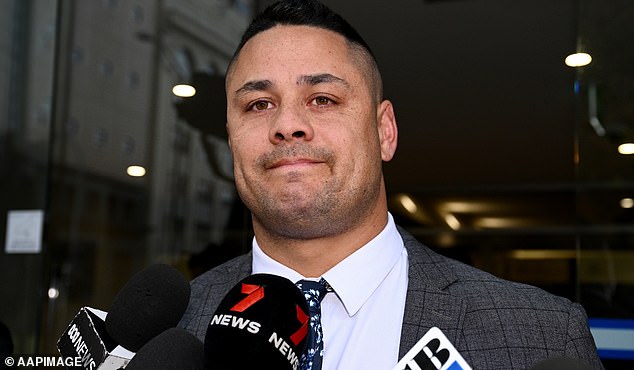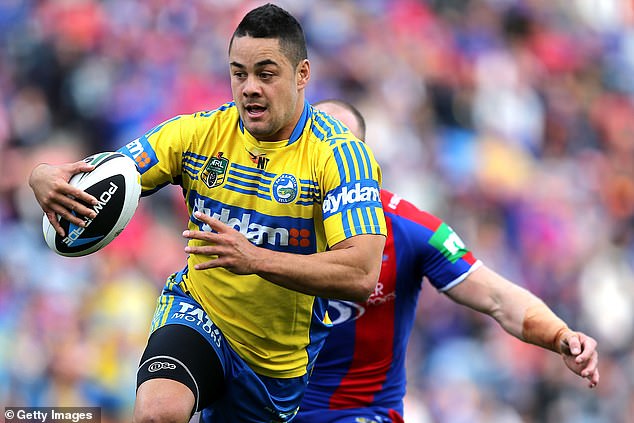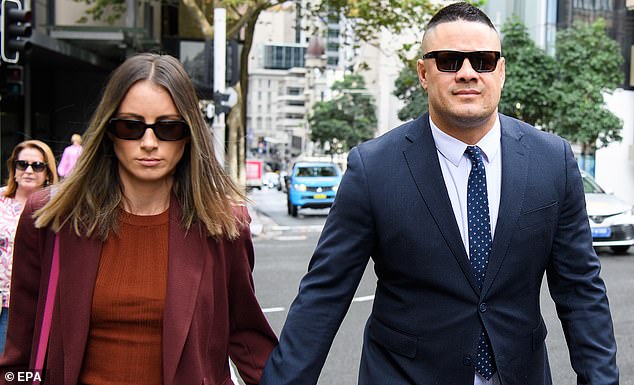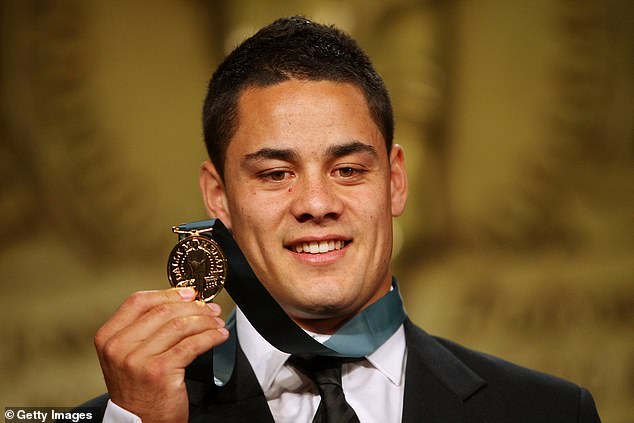Disgraced NRL star Jarryd Hayne hopes Facebook messages from a woman he was convicted of raping could be the key to his release from jail and his conviction overturned.
The two-time Dally M winner was found guilty of sexually assaulting the woman at his home in Newcastle, in the Hunter region of New South Wales, following a high-profile District Court trial last year.
Hayne, 36, continued to maintain his innocence and quickly filed an appeal against his conviction. It was the third time Hayne had faced trial for the same incident and the second time he had been found guilty.
The former Parramatta Eels defender claims the sexual encounter was entirely consensual, but the jury accepted the woman’s version of events that she repeatedly said “no” and “stop” and was left bleeding after he removed her pants .
Now his lawyers hope that the messages that the same woman deleted from her phone could be the key to acquitting the former star.

Disgraced NRL star Jarryd Hayne hopes Facebook messages from a woman he was convicted of raping could be the key to his release from prison and his conviction overturned.


The two-time Dally M winner was found guilty of sexually assaulting a woman at his home in Newcastle in the Hunter region of New South Wales in 2018.
Tim Game SC, representing Hayne, told the state’s highest court, the Court of Criminal Appeal, on Wednesday that his client should be acquitted rather than face a fourth trial.
He told the court that the woman, who cannot be identified for legal reasons, had hidden text and social media messages showing she was giving consent.
The messages relate to a Snapchat conversation she had with a friend, whom she had never met in person.
The complainant sent a message to her friend before and after meeting Hayne, where she told her about the sexual encounter, but did not say that it was non-consensual.
Game argued that concealment was “the same as lying or deceiving,” and said the woman concealed evidence on a “large scale.”
He told the court that the concealment was “front and centre” of the defense case, but that a miscarriage of justice arose when Judge Graham Turnbull SC, the District Court judge, ruled that the defense could not cross-examine the witness about her deleted or undisclosed messages with a man and woman before and after the incident.
In court papers, Hayne’s lawyers argued that they attempted to rely on the messages to suggest that she ‘deliberately concealed her communications with (the person) from the police and the prosecutor because she understood…they did not support her version of what happened and then (possibly) tried to influence it with respect to his evidence.”
The court was told the woman had heard Hayne’s previous appeal in 2021 and contacted the social media friend on Facebook on the same day.


Hayne, 36, has always maintained his innocence, insisting the sexual encounter was consensual (pictured, with wife Amellia Bonnici).
“I hope this was worth it to you,” the message read.
‘The pain I have endured from all of this is unfathomable. I have never lied. I’ve never done anything to you and you writing something to JH about me inviting him doesn’t excuse what happened.
‘I didn’t tell you because it was disgusting and confusing for me. If it comes out, you can thank yourself.
“This has been the hardest and most painful thing I have ever been through in my life and you can thank yourself for helping a guilty person.”
Hayne’s lawyers argue that the messages were relevant to the complainant’s credibility, showing that she contacted a witness in a “hostile manner.”
They argued that the woman “potentially” intended to influence the witness’s account.
“It also, importantly, highlights the plaintiff’s attitude toward (the woman’s) evidence, which did not support her account and that she was angry that the evidence had come to light,” court documents state.
Game said the concealment showed that she wanted to get rid of evidence that was “harmful,” but also because it showed that she was “really giving consent.”
He told the court: “It is evidence of dishonesty, and it also affects his credibility in a general sense.”


Hayne’s brilliant 2009 season saw him guide Parramatta to the NRL Grand Final and also win the Dally M Medal (pictured).
But Crown prosecutor Georgina Wright SC told the court the complainant did not tell the woman about the assault because they did not know each other well.
“He had never spoken to her or met her and he said he didn’t know her very well,” Mrs Wright said.
Ms Wright told the court the plaintiff had told close friends and family about the assault in the hours after the incident.
But he argued that the Facebook message to the social media friend was “consistent with an expression of frustration with the legal process”, denying claims that the complainant was hiding messages from police.
Hayne’s appeal is based on three grounds: the first is that the verdicts were unreasonable and not supported by evidence at trial; Second, the trial judge was wrong to rule that the plaintiff did not have to present evidence about an interaction in 2021 with the man she messaged on the same day. the jury found that she was sexually assaulted in 2018 and, ultimately, that the judge’s ruling resulted in a miscarriage of justice.
Hayne was sentenced to four years and nine months behind bars for the oral and digital sexual assault charges, but will be eligible for parole in May 2025 due to time already served in custody.
The ruling on the appeal will be handed down at a later date.

